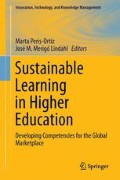Abstract
The newly established European Higher Education Area (EHEA) has prompted a reformulation of teaching methodologies, placing greater focus on student-centred learning. Integration of theory and practice together with development of academic skills have become important educational objectives.
The purpose of this research is to determine student perceptions of the application of active teaching methodologies, including collaborative learning and case studies for the development of generic skills. The research was conducted following protocol for designing learning activity as defined by the Institute for Science Education (ICE) at the Polytechnic University of Valencia.
Access this chapter
Tax calculation will be finalised at checkout
Purchases are for personal use only
References
Álvarez, M. B. (2005). Adaptación del método docente al Espacio Europeo de Educación Superior: La motivación de los alumnos como instrumento clave. Estudios sobre Educación, 9, 107–126. http://dspace.si.unav.es/dspace/bitstream/10171/8911/1/NB.PDF
Apocada, P. (2006). Estudio y trabajo en grupo. In M. de Miguel (Coord.). Metodologías de enseñanza y aprendizaje para el desarrollo de competencias. Orientaciones para el profesorado universitario ante el espacio europeo de educación superior (pp. 169–190). Madrid: Alianza.
Atwood, S., Turnbull, W., & Carpendale, J. I. M. (2010). The construction of knowledge in classroom talk. Journal of the Learning Sciences, 19(3), 358–402.
Barkley, S. F., Cross, K. P., & Howell, C. (2007). Técnicas de aprendizaje colaborativo. Madrid: Morata.
Braxton, J. M., Milen, J. E., & Sullivan, A. S. (2000). The influence of active learning on the college student departure process: Toward a revision of Tinto’s theory. Journal of Higher Education, 71(5), 569–590.
Cannon, R., & Newble, D. (2000). A handbook for teachers in universities and colleges. London: Kogan.
Casey, A., Dyson, B., & Campbell, A. (2009). Action research in physical education: Focusing beyond myself through cooperative learning. Educational Action Research, 17(3), 407–423.
Durán, D. (2009). Aprender a cooperar: Del grupo al equipo. In J. I. Pozo, & M. del P. Pérez (Coords.), Psicología del aprendizaje universitario: La formación en competencias (pp. 183–195). Madrid: Morata.
Exley, K., & Dennick, R. (2007). Enseñanza en pequeños grupos en Educación Superior. Madrid: Narcea.
Fernández March, A. (2006). Metodologías activas para la formación de competencias. Educatio Siglo XXI, 24, 35–56.
Goikoetxea, E., & Pascual, G. (2005). Aprendizaje cooperativo: Bases teóricas y hallazgos empíricos que explican su eficacia, 5, 227–247. http://www.uned.es/educacionXX1/pdfs/05-10.pdf
Hernández Pina, F., Martínez, P., Da Fonseca, P., & Rubio, P. (2005). Aprendizaje, competencias y rendimiento en educación superior. Madrid: La Muralla.
Herreid, C. F. (1994). Case studies in science: A novel method of science education. Journal of College Science Teaching, 23, 221–229.
Huber, G. (2008). Aprendizaje activo y metodologías educativas. Revista de Educación, No. Extra, 59–81
Johnson, D. W., Johnson, R. T., & Smith, K. (2007). The state of cooperative learning in postsecondary and professional settings. Educational Psychology Review, 19, 15–29.
León, M. J., & Crisol, E. (2011). Diseño de cuestionarios (OPPUMAUGR y OPEUMAUGR): La opinión y la percepción del profesorado y de los estudiantes sobre el uso de las metodologías activas en la universidad. Profesorado. Revista de currículum y formación del profesorado, 15, 271–298. http://www.redalyc.org/pdf/567/56719129018.pdf
Palazón-Pérez De Los Cobos, A., Gómez-Gallego, M., Cándido Gómez-Gallego, J. C., Pérez-Cárceles, M. C., & Gómez-García, J. (2011). Relación entre la aplicación de metodologías docentes activas y el aprendizaje del estudiante universitario. Bordón, 63(2), 27–40.
Parast, M. M. (2010). Effectiveness of case study in enhancing student learning in operations management. Operations and Supply Chain Management, 3(1), 49–58.
Rippin, A., Booth, C., Bowie, S., & Jordan, J. (2002). A complex case: Using the case study method to explore uncertainty and ambiguity in undergraduate business education. Teaching in Higher Education, 7(4), 429–441.
Ritt, L., & Stewart, B. (2010). Innovative strategies for teaching anatomy and physiology. TechTrends, 1, 41–42.
Roy, S., & Banerjee, P. (2012). Understanding students experience of transition from lecture mode to case-based teaching in a management school in India. Journal of Educational Change, 13(4), 487–509.
Serrano Gisbert, M. F. (Coord.). (2012). Aprendizaje Cooperativo en Contextos Universitarios. Murcia: Universidad de Murcia.
Slavin, R. E. (1989). Research on cooperative learning: An international perspective. Scandinavian Journal of Educational Research, 33(4), 231–243.
Tuning. (2008). Tuning educational structures in Europe. Universities’ contribution to the bologna process. An introduction. (2nd edn.). http://tuning.unideusto.org/tuningeu/
Urosa, B. (2004). Orientaciones para la selección y evaluación de actividades de aprendizaje dirigidas al desarrollo de competencias profesionales en el Espacio Europeo de Educación Superior. In J. C. Torre, & E. Gil (Comps.). Hacia una enseñanza universitaria centrada en el aprendizaje (pp. 191–218). Madrid: Universidad Pontificia Comillas.
Whitehead, D. P. (2008). Thoughts on education and innovation. Childhood Education, 85(2), 106–118.
Acknowledgements
Grupo de Investigación e Innovación Educativa en Metodologías Activas para el Desarrollo y Evaluación de Competencias Genéricas Interpersonales (MACGI). PIME 2013–2014.
Author information
Authors and Affiliations
Corresponding author
Editor information
Editors and Affiliations
Rights and permissions
Copyright information
© 2015 Springer International Publishing Switzerland
About this chapter
Cite this chapter
Barbera-Ribera, T., Estelles-Miguel, S., Dema-Perez, C.M. (2015). Student Opinion on the Application of Active Methodologies. In: Peris-Ortiz, M., Merigó Lindahl, J. (eds) Sustainable Learning in Higher Education. Innovation, Technology, and Knowledge Management. Springer, Cham. https://doi.org/10.1007/978-3-319-10804-9_12
Download citation
DOI: https://doi.org/10.1007/978-3-319-10804-9_12
Published:
Publisher Name: Springer, Cham
Print ISBN: 978-3-319-10803-2
Online ISBN: 978-3-319-10804-9
eBook Packages: Business and EconomicsBusiness and Management (R0)

